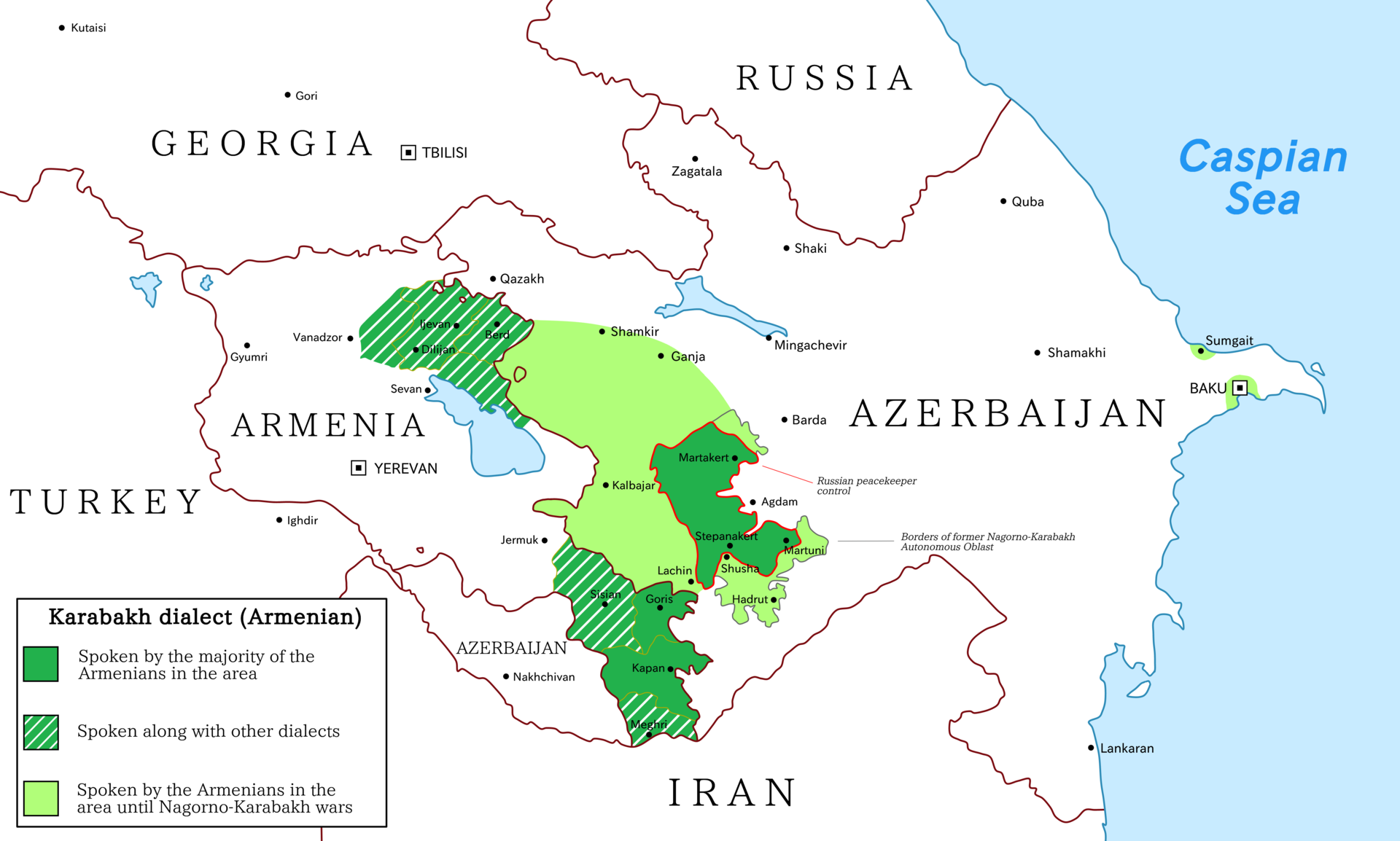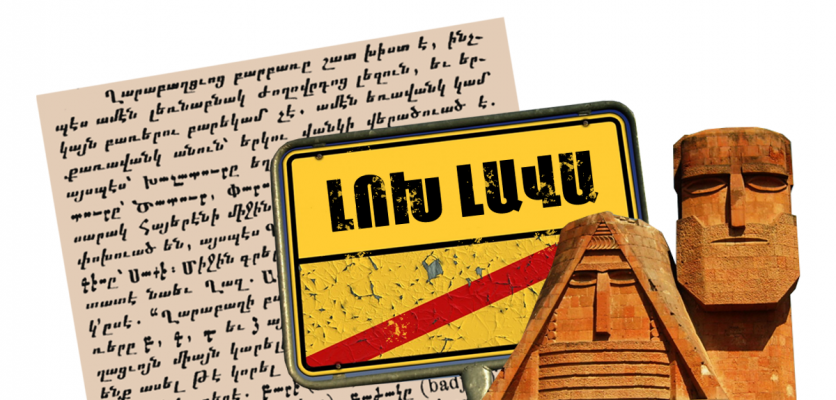A brief introduction to Artsakh's culture: Part II – The Artsakh/Karabakh dialect
October 13, 2020
With the recent outbreak of war in Artsakh, it is now more essential than ever to learn about the history of Artsakh when trying to understand the intensifying situation. Conflicting reports are widespread, misinformation is prevalent, and individuals with suspicious motives are a constant threat in falsifying the history of Artsakh.
Through h-pem and its efforts to inspire young Armenians to learn and embrace the Armenian homeland and its culture, we provide our readers with a brief introduction into the culture of Artsakh, consisting of some essential “facts you should know.” This series is not intended to be exhaustive and we welcome any suggestions for additions you may have!
The Artsakh or Karabakh dialect is an ancient Eastern Armenian dialect with a unique phonetic and syntactic structure, mainly spoken in Artsakh, as well as partially in the southern and northeastern parts of the Republic of Armenia.
The Karabakh dialect was also spoken by most Armenians living in Soviet Azerbaijan, particularly in the cities of Baku and Kirovabad (Gandzak/Ganja), as well as in parts of Russia where Armenians found refuge following anti-Armenian pogroms that took place in Azerbaijan in the late 1980s and early 1990s.
The eighth-century Armenian historian Stepanos Syunetsi was the first to mention the local dialect of Artsakh. Unlike in the Yerevan dialect, stresses fall earlier in each word in the Karabakh dialect. In addition to including many Classical Armenian (grabar) words, many word forms in the dialect come directly from the Proto-Indo-European language. Due to foreign invasion of the Armenian Highlands throughout history, the dialect includes a significant number of foreign words and phrases: Azerbaijani, Persian, Turkish, and Russian have had the biggest influence.
 The spread of the Karabakh dialect (Map: Wikimedia Commons)
The spread of the Karabakh dialect (Map: Wikimedia Commons)
The dialect, which consists of 46 sounds, is the only Armenian dialect with acute palatalization—pronouncing a consonant in which part of the tongue is moved close to the hard palate. It also features unique vowels and consonants that make it phonetically distinct in comparison with the literary Armenian language and the majority of other dialects of Eastern and Western Armenian.
Hrachia Ajarian, the renowned Armenian linguist and author of the comprehensive study of Armenian dialects, Classification des dialectes arméniens (Classification of Armenian Dialects), claimed in his book that the dialect spanned the largest area of the Armenian dialects. Ajarian noted that it was prominently spoken in the cities of Shushi, Elisabethpol (now Ganja), Nukha (now Shaki), Baku, Derbent, Agstafa, Dilijan, Karakiliseh (now Vanadzor), Kazak, Lori, Karadagh, Lilava quarter of Tabriz (Iran), Burdur and Ödemiş (in Turkey).
The spread of the Karabakh and other dialects reflected major Armenian displacement patterns of the 18th and 19th centuries caused by warfare between the Ottomans, Persians, and Russians. An interesting fact is that the Karabakh dialect was also spoken in two small Armenian communities in southwestern Turkey: Burdur and Odemis, located between Antalya and Izmir.
Ajarian revealed a plethora of discoveries about the Karabakh dialect when he first published his book. One of the main differences between the Yerevan dialect and the Karabakh dialect is that stress falls earlier in the word.
Examples
- ըվըտա'րան՝ (uvutaran) = աւետարան (avetaran | "bible")
- սօր՝ (sor) = այսօր (aysor |"today")
- ցըցէ'ռնակ՝ (tsuhtsernak) = ծիծեռնակ (tzitzernak | "swallow" bird)
- ծի'լի՝ (tzili) = ածելի (atzeli | "razor")
- ըրըսպըշտօ'թուն՝ (urusbushtotun) = երեսպաշտութիւն (yerespashtutiun | "flattery")
The Karabakh dialect features unique vowels and consonants that make it phonetically distinct compared with the literary Armenian language and many of the other Armenian dialects. In fact, these features do not have corresponding letters in the Armenian alphabet.
Hear the Karabakh accent in action! In the video below, Irina speaks two varieties of the language: standard Artsakh Armenian, (spoken primarily in Stepanakert, the Artsakh Republic's capital), and the Hadrut dialect of the country's east.
Learn some words and phrases
|
Karabakh Dialect |
Yerevan Dialect (Eastern) |
Standard Western Armenian |
Translation |
|
հի՞նչ hinch |
ի՞նչ inch? |
ի՞նչ inch? |
what? |
|
հո՞ւնց hunts |
ո՞նց vonts? |
ինչպէ՞ս inchpes? |
how? |
|
շտե՞ղ shtegh |
որտե՞ղ vortegh |
ո՞ւր oor? |
where? |
|
հունց ը՞ս hunts uss |
ո՞նց ես vonts es? |
ինչպէ՞ս ես inchpes es? |
how are you? |
|
գյու՛դըմ չըմ gyudum chum |
չգիտեմ chgitem |
չեմ գիտեր chem giter |
I don’t know |
|
լոխ լաւա lokh lava |
ամէն ինչ լաւ ա |
ամէն ինչ լաւ է amen inch lav eh |
everything is good |
*Armenian Wikisource: Հայերէն բարբառներ/Արցախ
Famous speakers of the Karabakh dialect
- Aram Manukian (1879–1919), founder of the First Republic of Armenia
- Hovannes Adamian (1879–1932), engineer, one of the founders of color television
- Artemi Ayvazian (1902–1975), Soviet Armenian composer
- Zori Balayan (b. 1935), writer, public activist
- Archbishop Pargev Martirosian (b. 1954), the primate of the Diocese of Artsakh
- Bekor Ashot (1959-1992), military commander, Hero of Artsakh
Sources:
- Ajarian, Hrachia (1909). Classification des dialectes arméniens [Classification of Armenian dialects] (PDF) (in Armenian). Originally published in Paris: Librairie Honore Champion.
- Gharibian, A (1966) K. S. Davtian, The Dialectal Map of Mountainous Gharabagh, Հայկական ՍՍՀ ԳԱ Yerevan, 1966,504 էջ. Patma-banasirakan hantes, 4. pp. 273-276.
- Stepanyan, G. K. (1959) Hrachia Ajarian (1876-1953). Patma-banasirakan hantes, 2-3 . pp. 190-203.
- Yervandian, Z. A. (2004). Հնագույն բառարմատները Ղարաբաղի բարբառում [Ancient root words in the Karabakh dialect]. Lraber Hasarakakan Gitutyunneri (in Armenian).
Read Part I of A brief introduction to Artsakh's culture: Churches & monasteries.
Video
Join our community and receive regular updates!
Join now!





Attention!